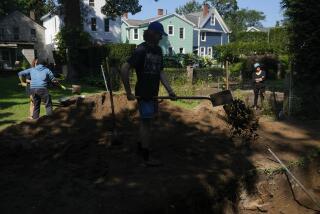Tough times, even in death
- Share via
CHICAGO — Their bodies are stacked on metal trays in the medical examiner’s 30-degree cooler, a warehouse-size refrigerator for the dead.
Here, the indigents wait. They lay on scaffold-like structures, six bodies high and three deep, while Cook County tries to find a family, an open estate or any means to bury them privately.
Those who remain unclaimed, unknown or simply forgotten are placed in a plywood box, which serves as a makeshift coffin. The box is loaded into a rented truck and hauled to Homewood Memorial Gardens.
Although the indigents may have died alone in life, they are buried together in death.
Most of them are identified, but their families either can’t be located or are unwilling or unable to pay for a better resting place. So municipalities use public money to dispose of the bodies. That cost has gone up significantly in the last few years, experts say, in part because of the declining economy.
Cook County had 24% more indigent burials in 2008 than the previous year. And coroners around the country say the number of government-paid burials and cremations started to rise when the economy tanked. Some cash-strapped localities have tapped reserves or emergency funds to cover the cost.
“For sure the economy has something to do with it. You’re seeing more people [who] have lost their jobs and have limited means to give someone a traditional burial,” said Tony Cox, the legislative chairman and former president of the Illinois Coroners and Medical Examiners Assn. “Unfortunately, you find family members who can’t do anything because they are in no better financial shape than the indigent person was. And you have those who have the means but want nothing to do with the deceased.”
Cook County paid for 193 burials in 2008, compared with 148 in 2007. The county is on track to top last year’s government-paid burials, with 165 through September.
Oregon and Wisconsin have seen increases too, as have the cities of Las Vegas and Chapel Hill, N.C. In Los Angeles, the coroner’s office had nearly 80% more indigent cremations in the last six months of 2008, compared with the same period in 2007.
“In this economy, people aren’t in a position to pay for private funerals and burials,” said Lt. David Smith, the supervising coroner’s investigator in Los Angeles. “And that includes the coroner’s office.”
In February, the L.A. coroner’s office sought and received $120,000 in emergency funding from the Board of Supervisors to cover the cost of cremations through the rest of the year.
At a September service at Homewood, Timothy Kowalski, who officiates Cook County’s indigent burials, said how a community cared for the dead said more about the living than the deceased.
“We do not know the circumstances in their lives that brought them to this grave,” Kowalski said. “Many may have died in poverty, others may have simply outlived their families. Our beginnings do not know our ends.”
Mortuary students dressed in their Sunday best helped carry coffins to the bottom of a trench. Once the gravediggers put all the caskets into the ground, the students backed away for a quick but somber service.
“We did not know these people. Many things about them will remain forever a mystery to us,” Kowalski said. “One thing we do know: They were human beings. And now, at the end of their lives, they deserve to be treated with dignity and respect.”
--
More to Read
Sign up for Essential California
The most important California stories and recommendations in your inbox every morning.
You may occasionally receive promotional content from the Los Angeles Times.












